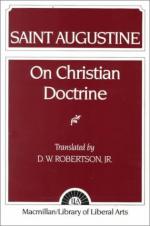
|
| Name: _________________________ | Period: ___________________ |
This quiz consists of 5 multiple choice and 5 short answer questions through Book Four.
Multiple Choice Questions
1. How should correct Scriptural interpretations be delivered, according to Augustine?
(a) With force and conviction.
(b) With the leading of the Holy Spirit.
(c) With humility.
(d) With authority.
2. What doctrine does Augustine introduce to explain how Truth can be seen?
(a) The doctrine of "community vision" is achieved when individuals join their desires to seek eternal truths illuminated by God.
(b) The doctrine of "special gifts of seeing" that God grants when individuals seek eternal truths illuminated by God.
(c) The doctrine of "things and signs" helps an individual know which things and signs illuminate eternal truths.
(d) The doctrine of the "inner eye" that can see eternal truths even when tainted by sin because it is illuminated by God.
3. What tool should pastors or speakers use occasionally to communicate the principles of Scripture to ordinary persons, as stated in Book Four?
(a) Summaries of Scripture in common language.
(b) The parables of Christ.
(c) Graphic illustrations.
(d) Colloquial phrases.
4. What does Augustine state signs are regardless of whether they want to be?
(a) Given signs.
(b) Natural signs.
(c) Signs that are words.
(d) Signs that are things.
5. What type of language from Scriptural characters must be taken literally, according to Augustine?
(a) Any speech or language that describes blessings for the chosen of God.
(b) Any speech or language that details the authority of God.
(c) Any speech or language that condemns evil and recommends love or kindness.
(d) Any speech or language that defines how a thing is a sign.
Short Answer Questions
1. What does Augustine say the student pass through if he/she will be able to understand Scripture?
2. What does Augustine say the Christian speaker should always seek eagerly?
3. What important understanding must the student of scripture possess, as stated in Book Two?
4. What is a personal possession that Augustine recommends for the Christian speaker?
5. How does Augustine relate Truth and God?
|
This section contains 477 words (approx. 2 pages at 300 words per page) |

|




